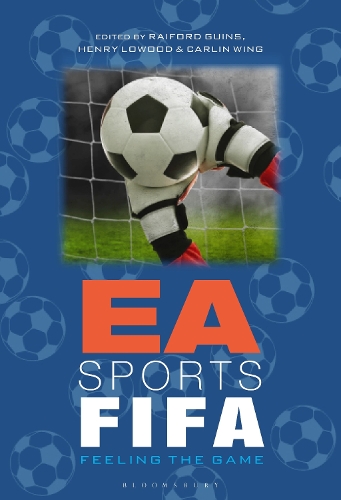
EA Sports FIFA: Feeling the Game
(Paperback)
Available Formats
Publishing Details
EA Sports FIFA: Feeling the Game
By (Author) Prof Raiford Guins
Edited by Henry Lowood
Edited by Carlin Wing
Bloomsbury Publishing PLC
Bloomsbury Academic USA
18th April 2024
United States
Classifications
Tertiary Education
Non Fiction
794.8
Physical Properties
Paperback
304
Width 152mm, Height 229mm
Description
If there is anything close to a universal game, it is association football, also known as soccer, football, fussball, ftbol, fitba, and futebol. The game has now moved from the physical to the digital - EAs football simulation series FIFA - with profound impacts on the multibillion sports and digital game industries, their cultures and players. Throughout its development history, EAs FIFA has managed to adapt to and adopt almost all video game industry trends, becoming an assemblage of game types and technologies that is in itself a multi-faceted probe of the mediums culture, history, and technology. EA Sports FIFA: Feeling the Game is the first scholarly book to address the importance of EAs FIFA. From looking at the cultures of fandom to analyzing the technical elements of the sports simulation, and covering the complicated relations that EAs FIFA has with gender, embodiment, and masculinity, this collection provides a comprehensive understanding of a video game series that is changing the way the most popular sport in the world is experienced. In doing so, the book serves as a reference text for scholars in many disciplines, including game studies, sociology of sports, history of games, and sports research.
Reviews
In this timely and much needed book, leading and emerging scholars provide new and necessary insights into a cultural phenomenon, that has always been more than just a game. By critically considering different aspects, and from perspectives, EA Sports FIFA: Feeling the Game provides a detailed and thought-provoking consideration of the impact this game series has had on the nature of video games, sport, and wider cultural life. * Garry Crawford, Professor of Sociology, University of Salford, UK *
This is a book whose time has come. Through a careful multidisciplinary focus on the FIFA video game franchise, the authors take up issues that range from the aesthetic complexities of digital play to forms of fandom, as well paying important attention to inclusion and gender. This collection offers a wonderfully rich engagement with one of the most popular titles around and is a must read for both sports and game scholars alike. * T.L. Taylor, Professor of Comparative Media Studies, MIT, USA *
This innovative and original collection of essays on the cultural significance of the videogame FIFA emphasises the blurring of our digital and material worlds. This book helps explain why, for millions of people around the world, the simulated experience of EA Sports FIFA series endures as a central aspect of diverse football and gaming cultures. For anyone interested in understanding the interplay between sport and videogames, and how this has transformed the mediatisation of sport more widely, this is an important collection. * Richard Haynes, Professor of Media Sport, University of Stirling, UK *
Author Bio
Raiford Guins is a Leeds United supporter. In his day-job he is a Professor & Chair of Cinema and Media Studies in the Media School, Adjunct Professor of Informatics, and Director of the Cultural Studies Program at Indiana University, Bloomington, USA. He is the author of Edited Clean Version: Technology and the Culture of Control (2009), Game After: A Cultural Study of Video Game Afterlife (2014), and Atari Design: Impressions on Coin-Operated Video Game Machines (Bloomsbury, 2020). Guins has also edited several collections and co-edits the MIT Press Game Histories Book Series with Henry Lowood and ROMchip: A Journal of Game Histories also with Lowood and Laine Nooney. He is currently writing a small book on Leeds United for Pitch Publishing. Henry Lowood is the Harold C. Hohbach Curator at Stanford University, USA, responsible for history of science & technology collections and film & media collections in the Stanford Libraries. Hehas combined interests in history, technological innovation and the history of digital games andsimulations to head several long-term projects at Stanford, including How They Got Game: TheHistory and Culture of Interactive Simulations and Videogames in the Stanford Humanities Laband Stanford Libraries, the Silicon Valley Archives in the Stanford Libraries, and the Machinima Archives and Archiving Virtual Worlds collections hosted by the Internet Archive. He led Stanford's work on game and virtual world preservation in the Preserving Virtual Worlds project funded by the U.S. Library of Congress and the Institute for Museum and Library services and the Game Citation Project also funded by IMLS. He is also the author of numerous articles and essays on the history of Silicon Valley and the development of digital game technology and culture. With Michael Nitsche, he co-edited The Machinima Reader (2011) and, with Raiford Guins, Debugging Game History: A Critical Lexicon (2016). With Guins, he also co-edits the book series, Game Histories. Carlin Wing is Assistant Professor of Media Studies at Scripps College, USA. She is an artist, educator, and media scholar. She is co-editor of The Techno-Galactic Guide to Software Observation, has published writing in Games and Culture, Public Books,Cabinet, and The Bulletin of the Serving Library, and has exhibited her work nationally and internationally. Her current book project, Bounce: A History of Balls, Walls, and Gaming Bodies, follows an array of bouncing balls through the histories of electronic and non-electronic games, across the spectrum of play, game, and sport and into the domains of physics, material science, animation, and computing in order to describe the worldviews and cultural contests that have been embedded in the architectures, instruments, and gestures of games of ball.
